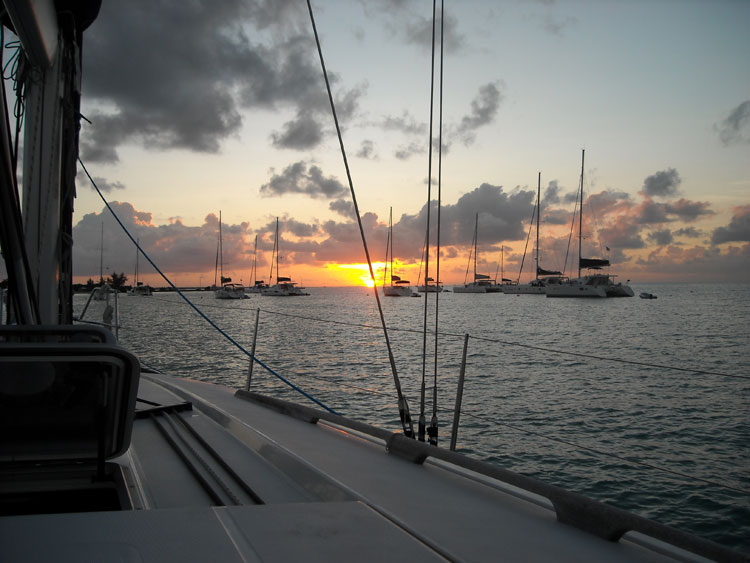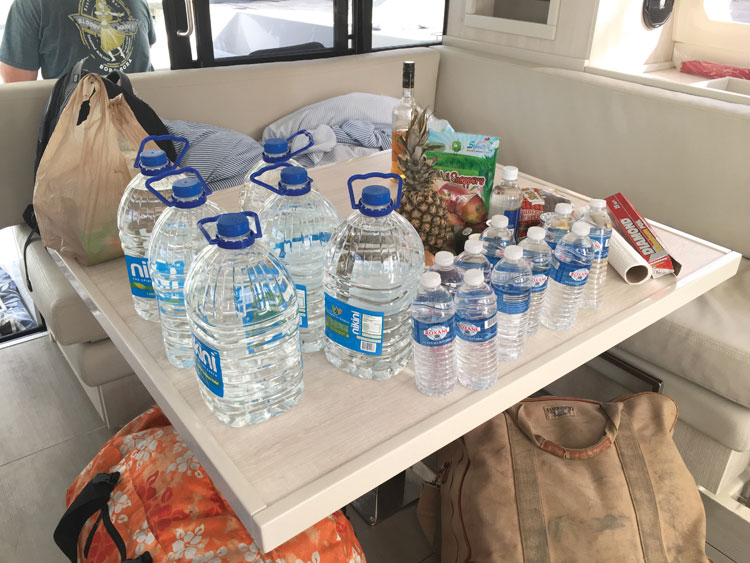A boat is a small city that must be completely self-sufficient. Managing effectively power, water, and waste on a sailing charter will make for a happy crew. Here are some tips on how to maximize (or minimize) each.

Power
Get comfortable with generating and managing power aboard so you don’t leave your crew in the dark.
Power generation and storage
Walk through the electrical system during your checkout and get answers to these questions: How many batteries are there, and how many amp hours do you have to work with? Is there a way to connect battery banks, and is there a separate starting battery, which is isolated in case the house bank is run down? Is there a genset or will you be charging solely off the engine(s)? Is there an inverter and how big is it?
If you are motoring every day from point to point, the batteries will be fine until the evening when the usage increases at dinner with lights, fans, and the stereo running. Charge after dinner when everyone is busy cleaning up.
Power usage and conservation
Refrigeration is a power hog, and in hot climates people go in and out frequently. Don’t put drinks in the fridge. Instead, keep a cooler in the cockpit filled with ice, soda, beer, and water. Discard any excess packaging before the food goes into the reefer so you have more room. Move quickly when you go into the fridge. Consider turning the fridge off at night when nobody will be opening the door.
Turn the engine(s) on before using the windlass, and check the voltage to make sure the winch has enough juice. If you have an electric winch to raise the dinghy onto davits, use it sparingly when the engine is off.
Air conditioning units eat power, so run only when plugged in at a marina. On the hook, the AC stays off and hatches get opened. Turn lights and fans off when not in the cabins and make sure faucets are completely off so the fresh water pump doesn’t continue to cycle.

Water
Water (and running out of it) may be the single most contentious issue on charter and its conservation is key to onboard harmony. Create a usage and replenishment strategy, and make sure that everyone is playing by the rules because there’s nothing crankier than dirty crew.
To drink or not to drink
If you don’t want to spend your week in paradise with intestinal distress, buy bottled water in large containers from which to fill individual water bottles. If you boil the water when you make coffee or pasta, it should be safe, but use your own judgment. If you have gum issues or are extra sensitive to change, brush your teeth with bottled water. Even if the water was good going into the boat, it’s hard to know how long it’s been in there, how old the plumbing and hoses are, and when the last time was that the tank got brushed and flushed.
Water consumption and usage etiquette
Confirm the size and number of your water tanks with the charter company, and understand that it may not be realistic for everyone to shower every day. Discuss the concept of the “navy shower” with your crew: get wet, water off, soap up, water on, rinse, and be done. Watch the water use on the swim step as well. Toss your swimsuit at your feet when you take a shower in the evening. It will get a fresh water rinse while you get clean.
If the boat has a saltwater foot pump at the galley sink, scrub dishes with saltwater, and then do a final rinse with fresh water. Do “pre-dishes” where everyone uses their napkin to wipe down their plates before putting them in the sink. It conserves water and makes the job easier for the galley slave.
Replenishing water
Ask your charter company where along your route, you’ll have an opportunity to tank up. If you’re lucky, you’ll have an onboard watermaker. Be sure to walk through your water system so you know where the manifolds are and how to switch between the tanks during use and filling.

Waste Management
As westernized humans, we tend to generate a lot of trash. Nowhere does that become more apparent than when you must tend to your own garbage on a boat.
Minimize it
Manage garbage by minimizing the amount you generate. Buy food in large containers from which you can dish out single servings. Refill personal water bottles from fewer large containers. Toss any excess packaging and cardboard boxes before you leave the charter base.
Don’t dump it and don’t burn it
Plastic can never go over the side while glass and food scraps can be thrown away when at a certain distance from land (check the local laws). When cruising inside reefs or near islands, don’t throw anything overboard. Nobody wants to go swimming in your potato peels. Don’t burn trash—you’re on a boat, seriously why would that even come up?
Stow it
Stow trash in the lazarette or in the dinghy (when on davits). Then, take it ashore at the next opportunity. Secure it so it doesn’t slide or bounce overboard in a rough seaway. If you need to carry trash any distance, double bag it or get ready for a mess.
By Zuzana Prochazka
Find more tips on charters and destinations here.




